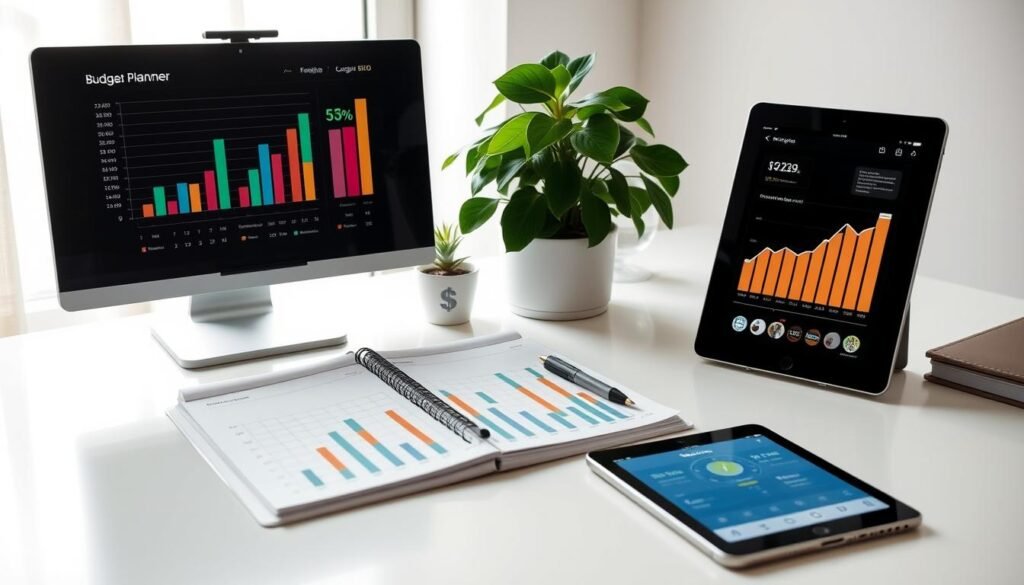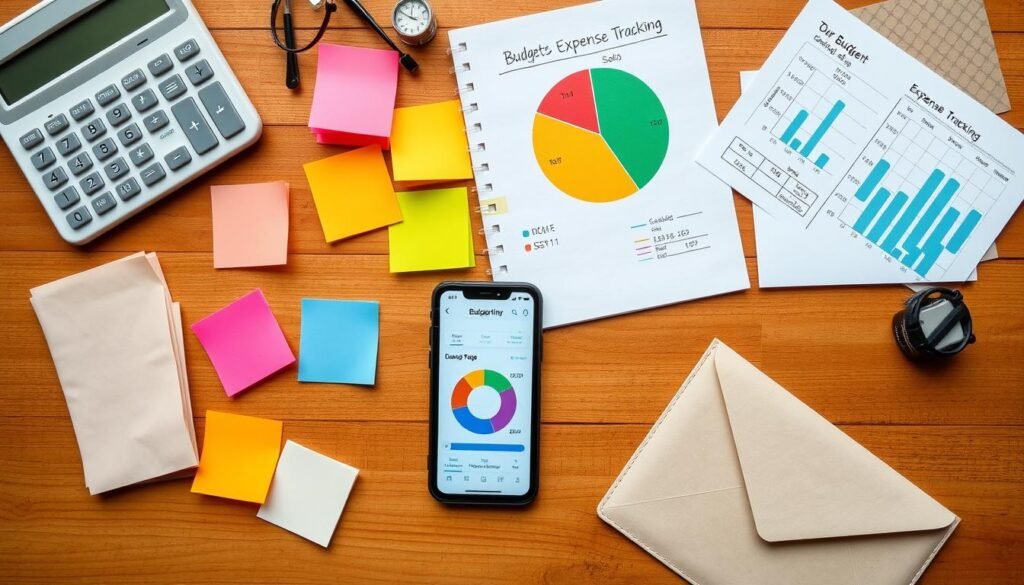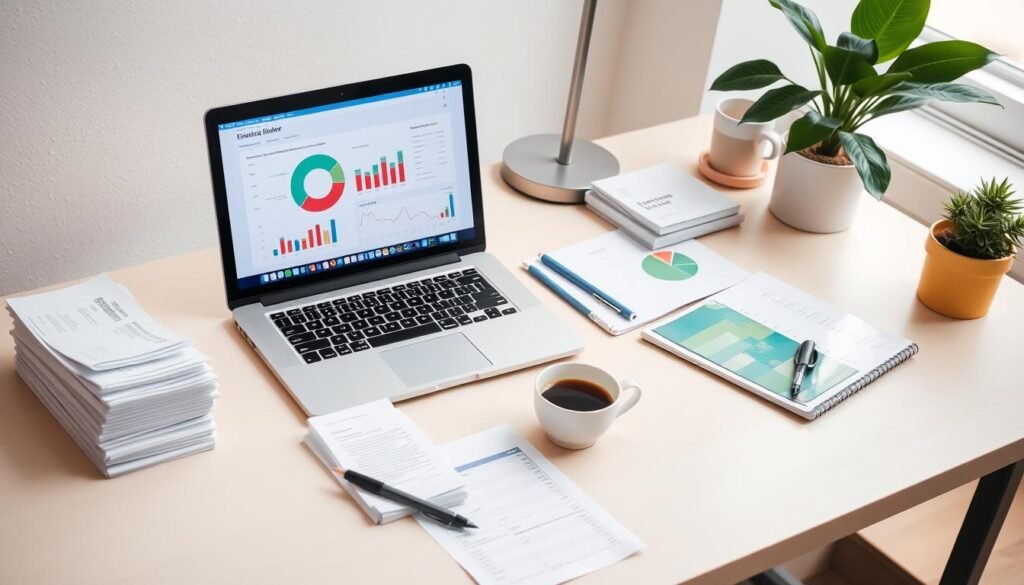Have you ever noticed your bank account balance dropping, even though you’re earning more? More than two-thirds of Americans feel the same way, based on a survey by Bankrate. They lack financial security due to not enough emergency savings, low retirement funds, and big debts.
Elizabeth and Jon, a couple in their mid-30s, know this struggle well. They’ve been married for 13 years and earn more than ever. Yet, they still live paycheck to paycheck. Why does this happen?
Elizabeth loves shopping too much, especially for clothes and deals she can’t resist. She grew up with little, so shopping is her way to feel better. This habit causes stress in their marriage and stops them from getting ahead financially. Jon is upset because their financial situation hasn’t improved, even with more money. They need to manage their money better and spend it wisely to change their lives.
Table of Contents
ToggleKey Takeaways
- Recording all expenses and categorizing them helps establish a spending baseline.
- Setting a comfortable savings rate in your budget can curb overspending.
- Automated transfers to savings accounts encourage consistent savings.
- Monthly budget reviews reinforce savings habits and resolve issues quickly.
- Mindful spending involves directed goals and conscious financial choices.
Understanding Your Financial Goals
Identifying your financial goals is crucial for financial success. This might mean saving for unexpected needs or retirement. Clear goals help guide your spending and manage finances better.

Short-term vs Long-term Goals
Short-term goals could include saving for emergencies or daily needs. You should start with a small emergency fund. Aim to grow this fund to cover several months’ expenses.
Long-term goals deal with major life milestones, like buying a home or planning retirement. It’s essential to balance both short and long-term goals for better financial management.
Importance of Writing Down Goals
Writing down your financial goals makes a big difference. It turns them into clear, tangible targets. This practice helps you follow a clear path for your finances.
It’s useful for tracking your financial journey and staying on course. For more advice, see our eBook on financial management.
Setting Achievable Targets
It’s important to set realistic financial goals. Start with small, easy goals like saving for a gadget or a trip. These small achievements build confidence and encourage saving.
With time and discipline, you can aim for bigger financial goals. This improves your saving habits and financial well-being.
Create a Realistic Budget
To manage money well, creating a realistic budget is key. First, understand your monthly income and expenses. This knowledge allows you to plan, avoid overspending, and use money wisely. Budgeting is an important skill to master.
Using Budgeting Tools
Budgeting tools make managing money easier. They sort your expenses and show where your money goes. Apps help you keep track of spending and control your budget better. For example, the 50/30/20 rule helps you divide your income wisely: 50% for needs, 30% for wants, and 20% for savings or paying off debt. Budgeting tools keep you within these limits.

Incorporating Savings into Your Budget
Savings are vital for a secure future. Save 15% of what you earn for retirement, experts suggest. Using a 401(k) plan, especially with an employer match, is smart. Start with a $500 emergency fund. Then, build a bigger savings cushion over time. Setting up automatic transfers to your savings can turn saving into a regular habit.
Tracking Regular and Irregular Expenses
It’s important to track both fixed and unexpected costs. Regular costs include rent and groceries. Irregular costs might be car repairs or health bills. To keep tabs on spending, record your purchases for a week or month. This helps you see exactly where your money goes.
Expense tracking apps can help a lot. They organize your spending into categories such as housing and food. This makes it easy to see where you can cut back. Staying honest and consistent with tracking ensures you have the data you need for a realistic budget. Cutting unnecessary spending means more money for debts, vacations, or future plans like college or retirement.
Being realistic with your spending is crucial. It’s okay to enjoy life, but don’t overspend. Check your budget often to stay on track. Keep focused on managing your money well.
Track Spending Effectively
To wisely manage your money, it’s crucial to track spending effectively. Using personal finance software gives accurate spending analysis. It keeps your finances healthy.
Utilizing Expense Tracking Apps
The digital world offers many apps to help manage finances. The Mint app, for example, gives deep insights into budgets. It shows you your spending habits clearly.
These apps keep you on top of bills and budgets. Want something based on the envelope method? Goodbudget is perfect. It starts free and offers more for a small fee.
Monitoring Daily Expenses
Watching daily spending is key to financial control. It also helps spot fraud early.
It doesn’t matter if you use a pen, envelopes, spreadsheets, or apps. What’s important is being consistent in tracking expenses.
Benefits of Categorizing Expenses
Sorting expenses into categories like Savings and Extras makes budgeting clearer. It shows where you can cut costs. Every dollar gets a purpose with zero-based budgeting.
Microsoft Office and Google Drive templates make this easier. They support both broad and detailed budgeting plans.

Using different methods to track spending leads to better habits. It ensures economic stability for the long haul. Make it a habit to review budgets and accounts regularly.
Adopting Mindful Spending Habits
Changing how you spend can really improve how you manage your money. By making sure your buying aligns with what matters to you, you’ll save more.
- Implement the 24-hour rule: Before you buy things you don’t really need, wait a day. This can cut down on quick buys.
- Plan your meals at home: Cooking instead of eating out saves money. It’s also healthier for you.
- Avoid automatic subscription renewals: Check your subscriptions regularly. Cancel ones you don’t use. Tools like Truebill can help with this.
Using personal finance software is a big help. It lets you see where your money goes and find ways to spend less. Even small buys, like your daily coffee, can add up to a lot each month.
- Set specific spending reduction goals: Having monthly targets can help you spend less on things like eating out or shopping.
- Use cash whenever possible: Paying with cash makes you more aware of what you’re spending.
- Freeze your credit cards: If it’s harder to use your cards, you’ll think more before you buy.
Comparing costs to how long you work to buy something can change how you see spending. Seeing purchases this way often leads to smarter choices. Trying not to spend now and then also shows what’s really needed versus what’s not.
Adding these steps to your life will make your financial management better. You’ll be closer to your money goals. With prices going up, many in the UK are already following these tips to cut costs.
Putting the money you save into savings or investments is a smart move. Options like ISAs can grow your savings faster, helping you reach financial independence.
Frugal Living Hacks for Cost Control
Frugal living hacks help you save money and manage your budget. By saving in day-to-day areas, you improve your financial health. Let’s look at some tips for frugal living.
Saving on Fixed Monthly Expenses
You can save on fixed monthly costs. Check your bills for insurance, cell phone plans, and utilities. Look for better deals often. Using smart thermostats and energy-efficient appliances helps lower bills. Simple actions, like limiting heating to necessary rooms and using less laundry detergent, save money.
Reducing Nonessential Spending
Cutting down on nonessential spending is another way to control costs. Look at your entertainment and dining out expenses. Cooking at home, buying in bulk, and packing lunches save a lot. Try making restaurant meals at home and use grocery pickup. It helps you spend less and supports good financial habits.
Exploring Free or Low-Cost Entertainment
You don’t have to lose out on life to save money. Use local community resources for affordable fun. Public libraries, parks, and community centers offer activities for free or cheap. Trying a “no spend” challenge saves money fast. Enjoy hobbies like reading, hiking, or DIY projects to have fun without spending much.
Using these frugal living tips daily impacts your savings. For more advice, check out this frugal living guide. They provide tips for smart financial choices and reaching your savings goals.
Conclusion
It’s important to have smart spending habits to manage money well. Start by setting clear financial goals and budget wisely. Doing this can lead you to financial success. You should aim to meet both your immediate needs and future dreams. This will help secure your financial future.
Budgeting apps are very useful in keeping track of your expenses. They aid in watching your daily costs and in creating emergency funds. Credit card debt is expected to hit $7,236 per borrower by Q3 of 2024. Therefore, it’s crucial to monitor how you spend your money. People under 50 can save up to $23,000 in their 401(k) in 2024, showing how vital it is to budget for retirement.
Being mindful of how you spend can greatly benefit your financial health. Cut back on unnecessary purchases and find cheaper ways to have fun. By saving even $50 a week, you can grow a solid emergency fund. Your housing expenses should be less than 28% of your gross income each month, though this might increase in pricier areas. Using the envelope system or zero-based budgeting can also enhance your financial discipline and decisions.
In the end, balancing now and later is key for financial well-being. Having a plan for your money helps streamline your finances and lead to real success. By applying these suggested practices diligently, you’re on your way to a better financial future and independence.
FAQ
Why is it important to set both short-term and long-term financial goals?
Setting financial goals helps guide your spending and saving actions. Short-term goals, like saving for a trip, keep you driven. Long-term goals prepare you for big events like buying a house or retiring.
How can writing down financial goals aid in better money management?
Having your goals in writing gives you clear targets. It helps track your success and steer your money choices.
What are some strategies for setting achievable financial targets?
Begin with easy, short-term goals to create momentum. Example: saving for new tech. Meeting these goals encourages bigger achievements over time.
How can a budgeting tool simplify financial management?
Budget tools help sort and track your spending, simplifying expense monitoring. They give updates on your budget, aiding goal achievement.
What is the best way to incorporate savings into a monthly budget?
Start by saving 15-20% of what you earn. Use automatic transfers to a savings account to keep saving consistent.
Why should regular and irregular expenses be tracked?
Knowing all your expenses gives a full financial picture. It helps plan for unexpected costs, avoiding surprise overspending.
How do expense tracking apps aid in effective spending control?
Apps for tracking expenses show you spending in real-time. This helps avoid overspending, detects fraud quickly, and simplifies budget analysis.
What are the benefits of monitoring daily expenses?
Watching your spending daily boosts financial discipline and helps keep expenses within budget. It increases money awareness and issue handling speed.
How does categorizing expenses help in effective spending management?
Sorting expenses lets you see where money goes, easing identification of saving spots. It aids in smarter cost control and budget adherence.
What are some tips for adopting mindful spending habits?
To spend wisely, wait a day before buying impulsively, cook more at home, and check subscriptions. These habits help spend with purpose.
How can frugal living hacks help control costs?
Living frugally by cutting monthly costs and limiting extra spending can save a lot. Enjoying cost-effective fun keeps savings intact.
What are some ways to save on fixed monthly expenses?
Look over fixed expenses like insurance or phone plans for savings opportunities. Adjusting these regularly keeps your budget in check.
How can exploring free or low-cost entertainment benefit your budget?
Choosing affordable fun, such as community events, saves money. It blends good times with smart spending.
Source Links
- 7 Simple Ways To Build Good Money Habits | Bankrate – https://www.bankrate.com/banking/savings/ways-to-build-good-money-habits/
- Smart Money Habits: 8 Ways to Grow Your Savings Fast – https://www.iwillteachyoutoberich.com/smart-money-habits/
- How to Set Financial Goals for Your Future – https://www.investopedia.com/articles/personal-finance/100516/setting-financial-goals/
- How To Track Your Spending And Slay Your Finances – https://www.forbes.com/sites/melissahouston/2024/01/12/how-to-track-your-spending-and-slay-your-finances/
- How to Budget Money: A 5-Step Guide – NerdWallet – https://www.nerdwallet.com/article/finance/how-to-budget
- How to Stick to Your Budget: Track Your Spending – https://www.aicpa-cima.com/resources/article/how-to-stick-to-your-budget-track-your-spending
- How to Track Expenses in Four Simple Steps – https://www.ramseysolutions.com/budgeting/how-to-track-expenses?srsltid=AfmBOoqJS019Ufy3MfHPldHyVWL34Z3d-ShTpprWJ9V16pLqMeOdHPjH
- 3 easy ways you can track your expenses and stay on top of your money – https://www.cnbc.com/select/how-to-track-expenses/
- 5 Easy Ways to Track Your Spending – https://www.elevate.com/article/easy-ways-to-track-spending
- Mindful Spending: 10 Simple Tips to Stay Financially Centered – https://www.bestegg.com/blog/mindful-spending/
- Mindful spending: how to stop spending money on unnecessary things – https://www.unbiased.co.uk/discover/personal-finance/budgeting/mindful-spending-how-to-stop-spending-money-on-unnecessary-things
- A Day in the Life of Our Family’s Frugal Living – Fun Cheap or Free – https://funcheaporfree.com/frugal-living/
- 11 Budget Hacks For Beginners That Save You Time and Money – https://www.howtomoney.com/budgeting-hacks/
- How to Budget Money: Your Step-by-Step Guide – https://www.investopedia.com/financial-edge/1109/6-reasons-why-you-need-a-budget.aspx
- How to Track Expenses in Four Simple Steps – https://www.ramseysolutions.com/budgeting/how-to-track-expenses?srsltid=AfmBOopeBfG3AOo1bAE5Zh0emHOqyoIRwSd9gtOTk9S7NgD8ozclJfof



